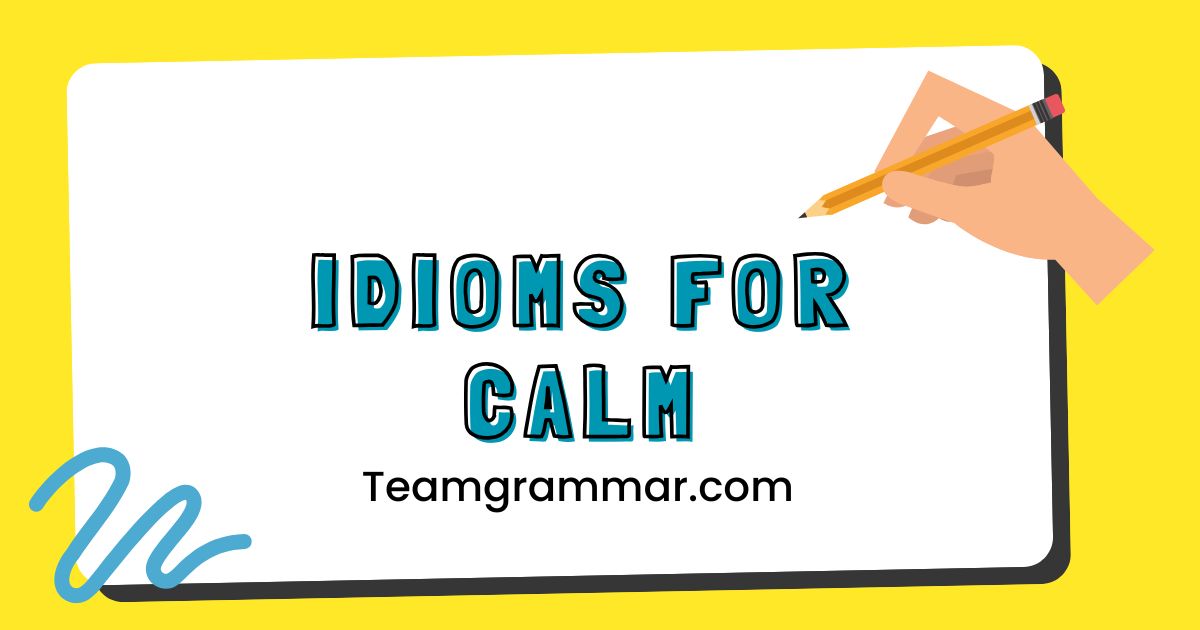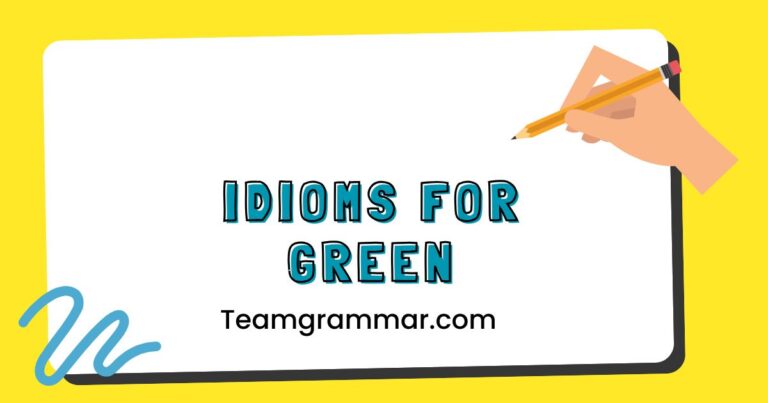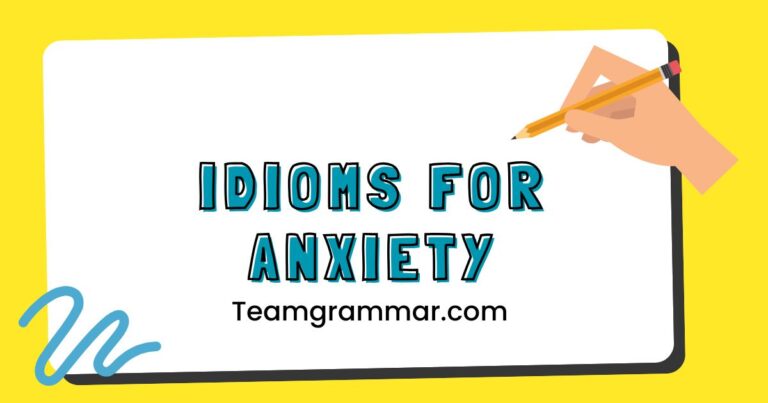36 Idioms for Calm: Mastering Serene English Expressions
Understanding idioms is crucial for mastering English, especially when expressing subtle nuances like calmness. These colorful expressions add depth and authenticity to your communication, allowing you to convey feelings of peace and tranquility more effectively.
This article explores a variety of idioms related to calmness, providing definitions, examples, and practice exercises to help you confidently incorporate them into your vocabulary. Whether you’re an English language learner or a native speaker, this guide will enhance your ability to express and understand calmness in diverse contexts.
Table of Contents
- Introduction
- Definition of Idioms for Calm
- Structural Breakdown of Idioms
- Types and Categories of Idioms for Calm
- Examples of Idioms for Calm
- Usage Rules for Idioms
- Common Mistakes When Using Idioms
- Practice Exercises
- Advanced Topics: Nuances and Variations
- Frequently Asked Questions (FAQ)
- Conclusion
Definition of Idioms for Calm
An idiom is a phrase or expression whose meaning cannot be understood from the literal meanings of its individual words. Instead, it has a figurative meaning that is known through common usage.
Idioms for calm are specific expressions that convey a sense of peace, tranquility, or composure. These idioms are essential for expressing and understanding emotions related to calmness in everyday conversation and writing.
Idioms related to calm can be classified based on the type of calmness they describe: physical, emotional, or situational. Each category provides a unique way to express different aspects of calmness, allowing for more nuanced and descriptive language.
Understanding these classifications helps in choosing the most appropriate idiom for a given context.
Structural Breakdown of Idioms
Idioms, unlike regular phrases, operate on a non-compositional principle; their meaning is not derived from the sum of their parts. Instead, they function as single semantic units.
Structurally, idioms can take various forms, including verb phrases, noun phrases, and prepositional phrases. Understanding the grammatical structure of an idiom helps in using it correctly within a sentence.
For example, the idiom “cool as a cucumber” is an adjectival phrase used to describe someone who is very calm and composed. The structure of this idiom involves a simile, comparing someone’s calmness to the coolness of a cucumber.
Recognizing such patterns can aid in better comprehension and application of idioms.
Types and Categories of Idioms for Calm
Idioms for calm can be categorized based on the specific aspect of calmness they describe. These categories include idioms describing physical calm, emotional calm, and situational calm.
Each category offers unique expressions for conveying different facets of tranquility and composure.
Idioms Describing Physical Calm
These idioms describe a state of physical relaxation and tranquility. They often relate to a lack of physical tension or agitation.
Examples include expressions that suggest stillness, ease, and absence of physical stress.
Idioms Describing Emotional Calm
These idioms focus on emotional composure and the absence of anxiety or stress. They often involve metaphors relating to inner peace, emotional stability, and the ability to handle stress without becoming agitated.
These are useful for describing someone’s inner state.
Idioms Describing Situational Calm
These idioms describe a sense of peace and order in a particular environment or situation. They often refer to the absence of chaos, conflict, or disturbance.
These can describe the external environment and its impact on feelings of calm.
Examples of Idioms for Calm
The following sections provide examples of idioms for calm, organized by the categories discussed above. Each example is accompanied by a definition and a sentence demonstrating its usage in context.
Examples Describing Physical Calm
The following table provides examples of idioms that describe physical calm. Each idiom is defined, and a sentence illustrating its use is provided to give context.
| Idiom | Definition | Example Sentence |
|---|---|---|
| Still waters run deep | A quiet or placid manner may conceal great depths of character or feeling. | He may seem quiet, but still waters run deep; he’s incredibly insightful. |
| Keep a cool head | To remain calm and composed in a difficult situation. | It’s important to keep a cool head when dealing with emergencies. |
| Steady as a rock | Reliable and unwavering, especially in a crisis. | Despite the market crash, he remained steady as a rock. |
| Cool, calm, and collected | Completely in control and composed. | She handled the presentation in a cool, calm, and collected manner. |
| Take it easy | To relax and avoid stress or overexertion. | After a long day at work, I just want to take it easy. |
| Keep your shirt on | Stay calm and don’t get angry. | Keep your shirt on! We’ll figure out the problem. |
| As cool as a cucumber | Very calm and composed, especially in a stressful situation. | Despite the pressure, she was as cool as a cucumber. |
| Breathe easy | To relax and feel relieved. | Now that the project is finished, we can all breathe easy. |
| Sit tight | To remain still and wait patiently. | Sit tight, the doctor will be with you shortly. |
| Hold your horses | Wait and be patient. | Hold your horses! Let’s think this through before we act. |
| Keep a level head | To stay calm and rational. | In a crisis, it’s essential to keep a level head. |
| Take a chill pill | Relax and calm down. | You need to take a chill pill and stop worrying so much. |
| As gentle as a lamb | Very mild and calm in nature. | The dog is as gentle as a lamb with children. |
| Tranquil as a sleeping baby | Extremely peaceful and undisturbed. | The room was tranquil as a sleeping baby. |
| Serene as a mountain lake | Calm and undisturbed, like a peaceful lake. | Her face was serene as a mountain lake. |
| Placid as a pond | Calm and quiet, without any disturbances. | The water was placid as a pond on a windless day. |
| Easy does it | Be careful and gentle. | Easy does it when you’re lifting that heavy box. |
| Lighten up | Become more cheerful and less serious. | Lighten up! It’s just a game. |
| Simmer down | Calm down after being angry or excited. | Simmer down, there’s no need to shout. |
| Keep it down | Be quieter and calmer. | Please keep it down, some people are trying to sleep. |
| Mellow out | To become more relaxed and calm. | After a stressful week, I just want to mellow out. |
| Take a breather | To take a short break to relax. | Let’s take a breather before we start the next task. |
| Compose yourself | To regain control of your emotions and behavior. | She needed a moment to compose herself before speaking. |
Examples Describing Emotional Calm
The following table provides idioms describing emotional calm. These idioms focus on the inner state of a person, their feelings and emotional stability.
| Idiom | Definition | Example Sentence |
|---|---|---|
| Peace of mind | A state of mental calmness and freedom from worry. | Knowing my family is safe gives me peace of mind. |
| In a good place | In a positive emotional state. | After overcoming her challenges, she’s finally in a good place. |
| Keep your spirits up | To remain cheerful and optimistic. | Even during difficult times, it’s important to keep your spirits up. |
| Take heart | Be encouraged and don’t lose hope. | Take heart, things will get better. |
| Find your center | To find inner peace and balance. | Meditation helps me find my center. |
| Rise above | To overcome negative emotions or situations. | She managed to rise above the criticism and succeed. |
| Turn the other cheek | To forgive an insult and not retaliate. | He chose to turn the other cheek and move on. |
| Let it go | Release negative feelings and stop dwelling on something. | Sometimes, the best thing to do is just let it go. |
| Keep things in perspective | Maintain a balanced view and avoid overreacting. | It helps to keep things in perspective when dealing with minor setbacks. |
| Count your blessings | Be grateful for the good things in your life. | When you’re feeling down, count your blessings. |
| Look on the bright side | Focus on the positive aspects of a situation. | Even though it’s raining, let’s look on the bright side. |
| Keep the faith | Maintain hope and trust in a positive outcome. | Even when things are tough, you have to keep the faith. |
| Have a thick skin | Be impervious to criticism or insults. | You need to have a thick skin in this industry. |
| Take things in stride | Accept and deal with difficulties calmly. | She took the challenges in stride and kept moving forward. |
| Don’t sweat it | Don’t worry about it. | Don’t sweat it, we’ll figure it out. |
| Brush it off | Ignore or dismiss something negative. | He just brushed off the rude comment and continued his presentation. |
| Keep your chin up | Stay positive and don’t be discouraged. | Keep your chin up, things will get better. |
| Nip it in the bud | Stop something at an early stage before it becomes a problem. | We need to nip these rumors in the bud before they spread. |
| Ride out the storm | Endure a difficult period until it passes. | We just need to ride out the storm and things will improve. |
| Weather the storm | Survive a difficult situation. | The company managed to weather the storm of the recession. |
| Turn a blind eye | Ignore something that you know is wrong. | The manager chose to turn a blind eye to the employee’s misconduct. |
| Get over it | Recover from a disappointment or upsetting event. | It’s time to get over it and move on. |
| Let bygones be bygones | Forgive and forget past quarrels. | Let bygones be bygones; let’s start fresh. |
| Forgive and forget | To completely forgive someone and forget about their mistake. | It’s important to forgive and forget to maintain healthy relationships. |
Examples Describing Situational Calm
This table presents idioms that describe situational calm. These idioms apply to environments or scenarios that are peaceful and orderly.
| Idiom | Definition | Example Sentence |
|---|---|---|
| Clear the air | To resolve a tense or awkward situation through open communication. | We need to clear the air and discuss our differences. |
| Smooth sailing | A situation that is progressing without any problems. | After the initial challenges, it’s been smooth sailing. |
| Plain sailing | Easy and without difficulties. | Once we got the initial setup done, it was plain sailing. |
| All quiet on the Western Front | No news or activity, often suggesting a deceptive calm. | After the negotiations, it was all quiet on the Western Front. |
| Calm before the storm | A period of peace and quiet before a period of great activity or turmoil. | The calm before the storm is often the most unsettling. |
| Still the waters | To calm a situation or reduce tension. | The mediator tried to still the waters between the two parties. |
| Keep the peace | Maintain order and avoid conflict. | The police are there to keep the peace. |
| Quiet as a mouse | Very quiet and unobtrusive. | The children were quiet as a mouse while their mother was sleeping. |
| Peace and quiet | A state of tranquility and absence of noise or disturbance. | All I want is some peace and quiet. |
| A lull in activity | A temporary pause in activity or noise. | There was a lull in activity before the final rush. |
| In the eye of the storm | In a place or situation where there is relative calm amidst chaos. | He remained calm in the eye of the storm. |
| A sea of tranquility | A state or place of great peace and calmness. | The garden was a sea of tranquility. |
| Like a well-oiled machine | Functioning smoothly and efficiently. | The project is running like a well-oiled machine. |
| Running smoothly | Proceeding without problems or interruptions. | The event is running smoothly so far. |
| Water off a duck’s back | Having no effect on someone. | Criticism is like water off a duck’s back to him. |
| The coast is clear | There is no danger or obstacle in the way. | The coast is clear, you can go ahead. |
| Clear sailing ahead | No obstacles or difficulties are expected. | With the new plan in place, it’s clear sailing ahead. |
| Quiet before the dawn | A period of calm before something significant happens. | This might be the quiet before the dawn of a new era. |
| A breath of fresh air | Something new and refreshing. | Her innovative ideas were a breath of fresh air. |
| A sanctuary of peace | A place where one can find peace and quiet. | The library is a sanctuary of peace. |
| Calm waters | A peaceful and untroubled situation. | We’re hoping for calm waters after the turbulent times. |
Usage Rules for Idioms
Using idioms correctly requires understanding their specific meanings and contexts. Here are some general rules to follow:
- Context is Key: Always consider the context in which you are using the idiom. Idioms can have different connotations depending on the situation.
- Word Order: Do not change the word order of an idiom. Altering the structure can change the meaning or make the idiom nonsensical.
- Tense and Agreement: Adjust the tense and grammatical agreement as needed to fit the sentence structure. For example, “keep a cool head” can be changed to “keeping a cool head.”
- Audience Awareness: Be mindful of your audience. Some idioms may not be understood by non-native speakers or people from different cultural backgrounds.
Common Mistakes When Using Idioms
Here are some common mistakes to avoid when using idioms:
| Incorrect | Correct | Explanation |
|---|---|---|
| He is as cold as a cucumber. | He is as cool as a cucumber. | The correct idiom is “cool as a cucumber,” not “cold.” |
| Take it easily. | Take it easy. | “Take it easy” is the correct expression for relaxing. |
| Keep your shirt in. | Keep your shirt on. | The idiom is “keep your shirt on,” meaning stay calm. |
| Breathe easier. | Breathe easy. | The idiom is “breathe easy,” meaning to relax. |
| Sit tightly. | Sit tight. | The correct idiom is “sit tight,” meaning to wait patiently. |
Practice Exercises
Test your understanding of idioms for calm with the following exercises.
Exercise 1: Fill in the blanks with the correct idiom.
| Question | Answer |
|---|---|
| 1. Even though he was under pressure, he remained _____________. | cool, calm, and collected |
| 2. After a stressful day, I just want to _____________. | take it easy |
| 3. _____________, we’ll figure out the problem. | Keep your shirt on |
| 4. Now that the project is finished, we can all _____________. | breathe easy |
| 5. _____________, the doctor will be with you shortly. | Sit tight |
| 6. ____________! Let’s think this through before we act. | Hold your horses |
| 7. In a crisis, it’s essential to _____________. | keep a level head |
| 8. You need to ____________ and stop worrying so much. | take a chill pill |
| 9. Knowing my family is safe gives me _____________. | peace of mind |
| 10. It helps to ____________ when dealing with minor setbacks. | keep things in perspective |
Exercise 2: Match the idiom with its definition.
| Idiom | Definition | Answer |
|---|---|---|
| 1. Still waters run deep | a. Remain cheerful and optimistic | 1. b |
| 2. Keep your spirits up | b. A quiet manner may conceal great depth | 2. a |
| 3. Take heart | c. Relax and calm down | 3. d |
| 4. Take a chill pill | d. Be encouraged and don’t lose hope | 4. c |
| 5. Let it go | e. Release negative feelings | 5. e |
Exercise 3: Use the given idioms in a sentence.
Write a sentence using each of the following idioms:
- Peace of mind: The insurance policy gave her peace of mind knowing her home was protected.
- In a good place: After years of struggle, he was finally in a good place emotionally.
- Clear the air: They needed to clear the air after the misunderstanding.
- Smooth sailing: Once the initial hurdles were overcome, the project was smooth sailing.
- Calm before the storm: The quiet morning was just the calm before the storm of a busy day.
Advanced Topics: Nuances and Variations
For advanced learners, it’s important to understand the nuances and variations of idioms. Some idioms have regional variations or slightly different meanings depending on the context.
For example, the idiom “take it easy” can mean “goodbye” in some regions, while in others, it means “relax.”
Additionally, some idioms can be creatively adapted while maintaining their core meaning. However, it’s crucial to ensure that the adaptation is still recognizable and appropriate for the context.
Overly creative alterations can lead to confusion or misinterpretation.
Frequently Asked Questions (FAQ)
- What is the difference between an idiom and a proverb?
An idiom is a phrase with a figurative meaning, while a proverb is a short, well-known saying that expresses a general truth or piece of advice. Idioms focus on expression, while proverbs focus on wisdom.
- How can I learn new idioms effectively?
Read widely, listen to native speakers, and keep a notebook of new idioms. Practice using them in your own speech and writing to reinforce your understanding.
- Are idioms universal across all English-speaking countries?
No, idioms can vary significantly between different English-speaking countries and regions. What is common in British English might be unfamiliar in American English, and vice versa.
- Can I use idioms in formal writing?
It depends on the context. While idioms can add color to your writing, they are generally more appropriate for informal or creative writing than for formal academic or professional contexts. Consider your audience and the tone of your writing.
- Is it possible to overuse idioms?
Yes, overuse of idioms can make your language sound unnatural or cliché. Use them sparingly and appropriately to enhance your communication, not to clutter it.
- How do I know when to use an idiom versus a literal expression?
Consider the effect you want to achieve. Idioms add color and emphasis, while literal expressions are more direct and straightforward. Choose the option that best suits your purpose and audience.
- What should I do if I don’t understand an idiom?
Ask for clarification. Don’t be afraid to ask a native speaker or consult a dictionary or online resource to understand the meaning and usage of the idiom.
- Are there any resources that can help me learn more idioms?
Yes, there are many online dictionaries, language learning websites, and books dedicated to idioms. Look for resources that provide definitions, examples, and practice exercises.
- How important is it to understand idioms to become fluent in English?
Understanding idioms is very important for achieving fluency in English. While you can communicate without them, idioms are a significant part of everyday conversation and cultural understanding. Mastering idioms will make your English sound more natural and nuanced.
- What is the best way to remember idioms?
Associate idioms with visual images or personal experiences. Create flashcards, use them in sentences, and try to incorporate them into your daily conversations. Repetition and context are key to memorization.
Conclusion
Mastering idioms for calm is an essential step in improving your English language skills and expressing nuanced emotions effectively. By understanding the definitions, usage rules, and common mistakes associated with these expressions, you can confidently incorporate them into your vocabulary.
Remember to practice regularly, pay attention to context, and be mindful of your audience to use idioms appropriately and enrich your communication.
Continue to explore and learn new idioms to expand your linguistic repertoire and enhance your ability to express yourself with precision and flair. With consistent effort and practice, you’ll find that idioms become a natural and valuable part of your English communication skills.
Embrace the richness and color that idioms bring to the English language, and enjoy the journey of mastering these expressive phrases.







